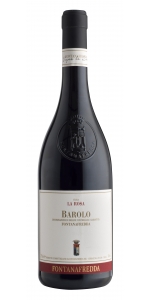Wine from Fontanafredda
Born in 1858 from the love story between the King of Italy, Vittorio Emanuele II, and Rosa Vercellana. We have always been a community, united by respect for the land, and today we have 120 hectares of ORGANIC crops that frame Italy’s first Storytelling Village.
We have 120 hectares of land, divided between the municipalities of Serralunga d’Alba, Barolo, Diano d’Alba, Dogliani, Farigliano, Alba and Rodello, at altitudes ranging between 250 and 420 metres above sea level, cultivated with Nebbiolo, Barbera, Dolcetto, Nascetta, Pinot Noir, Chardonnay and Moscato, which represent the starting point for the remarkable quality of our wines.
The climate is typically continental, but with considerable variability in terms of rainfall and temperature, resulting in an extraordinary diversity of harvests.
The richness of our soils is due to their mainly calcareous composition with different textures even just a few metres apart, ranging from looser soils, with as much as 50% sand, such as those at the farthest end of Serralunga d’Alba and Barolo, to more loamy and clayey soils, like those in the highest area of Serralunga.
Our vines are old, having been planted between 1940 and 1999, and this allows us to have significant root depths that reward the qualitative diversity of each individual M.G.A.. When replacing vines or replanting our vineyards we use our own massal selections in order to maintain the same genetic material that has always distinguished Fontanafredda. And we experiment on small plots with new planting layouts or grafting systems that favour clean agriculture.
We are among the last producers to have maintained extensive woods in the Bassa Langa region, with a woodland area of 12 hectares. This helps us to increase the plant and animal biodiversity that facilitates our ORGANIC farming, launched in 2015 and certified in 2018. No herbicides, no pesticides, no synthetic fertilisers.
Practising organic farming stimulates the symbiotic relationship between vineyards and woods, with their respective wild flora and fauna. By keeping the pedological characteristics of our soils intact, we increase the development of the micro-organisms that determine the amount of organic matter in our soils for the enrichment of biodiversity.
We see organic farming not merely as a form of agriculture but as a way of life, which involves identifying with the plant as a living being and eliminating all unnecessary chemicals.
Reviews:
On the savory side, this red opens with freshly mowed grass, hay and eucalyptus aromas before revealing cherry, strawberry, rose and mineral flavors. Fleshy, with a matrix of dense tannins flexing their muscles on the finish. Shows excellent potential. Best from 2023 through 2042.
-Wine Spectator 96 Points
Floral and red fruit nose. Supple attack, very polished and concentrated, with fine-grained tannins and ample acidity. This has a linear drive, precision. and a very long finish. The rewards will be substantial for the patient consumer.
-Decanter 97 Points
- back
Selected Options
Wineries
Categories
Pricing
Countries
Regions
Grape Types
Wineries
Organic/Free Shipping
Lingua Franca The Plow Pinot Noir is made from 100 percent Pinot Noir.
A large proportion of fruit from some of our finest sites, 48% coming from Blocks 1 - 3, planted with PN777 clone. Another 44% is sourced from two blocks of the bold PN 115. The elegant and nuanced PN777 Pinot Noir grown on Gelderman-Jory soils creates the top notes of mineral, rose petal and savory elements while the PN115 provides the fruit, body and weight of the wine.
Loin of lamb, Filet Mignon, veal chop, veal scallopini, pasta with Bolognese sauce, charcuterie, hard cheeses, hamburger, Viennese boiled beef (Tafelspitz), Wienerschnitzel, Kalbi, Bulgogi. Teriyaki, Vietnamese shaking beef, Chinese broccoli beef or Feast of the Immortals? Experimentation is welcome!
Review:
The 2022 Pinot Noir Estate saw 20% whole clusters and 20% new oak. A representation of the vineyard, the blend can vary from year to year. The 2022 is a ripe ruby color and opens to notes of spice and ripe raspberries. Medium-bodied, it’s a great appellation wine, with ripe tannins and a great finish. Drink 2024-2036. A few thousand cases were produced.
-Jeb Dunnuck 94 Points
Luis XIV Lo de Pepitin is made from 80% Monastrell,14% Giro, 3% Arcos and 3% Bobal.
"Wine from a historic plot, named after Mr. Pepitin, the farmer who looked after these vines throughout his life."
Old vines (1980) planted in a bush style and dry land. 610 metres above sea level in the town of Biar. Sandy clay loam soil, with a high presence of limestone. Historic plot, reproduced by massal selection and with a wide variety of old clones of traditional Alicante varieties.
Production: Indigenous yeasts in our 19th century winery.
Fermentation: 50% in stainless steel, and 50% fermentation in vats.
70% Grapes crushed by foot and destemmed manually.
30% whole bunches.
Low extraction.
Aging : 50% of the wine was aged for 8 months in 500-liter French oak barrels ; and the other 50% were aged for 8 months in century-old 500-litre Amphora from Villarrobledo, considered the finest in Spain and which allows the wine to be stored inside without any coating: just pure clay.





